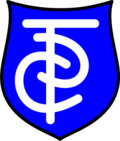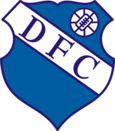- DFC Prag
-
DFC Prag 
Full name Deutscher Fussball Club Prag Founded 1896 Ground Stadion Belvedere
(Capacity: 18,000)League various - defunct Home coloursAway coloursThe Deutscher Fussball Club Prag (Czech: DFC Praha, English: DFC Prague) was a German association football club that played in the city of Prague in what is today the Czech Republic, but was at the time of the club's founding on 25 May 1896, part of Bohemia in the Austro-Hungarian Empire. Originally the club was the football department of the Deutscher Eis- und Ruder-Club Regatta Prag established in 1891, consisted of ethnic Germans.
Contents
History
Founding member of the German Football Association
The multi-national character of Austria-Hungary created some confusion for footballers of the period as they could find themselves playing in the "national" leagues of Germany, Austria, Hungary or Czechoslovakia. It was common for sports clubs to be founded based on the shared ethnicity of their members and DFC Prag was created by a group of German Jews, many of them students at Charles University in Prague.
When it was formed in 1896, the German Football Association (Deutscher Fussball Bund or German Football Association), actively sought out members among ethnically German clubs from outside of the country. DFC Prag was a founding member of the German association and its president, Dr. Ferdinand Hueppe, became the first president of this new national association.
Contesting Germany's first championship
DFC Prag was a very strong side at the time: they were Czech champions in 1896, played in Germany's first ever national final in 1903, and repeated as Czech champions in 1917. The story of Prag's appearance in that 1903 final is an odd one as they got there without having to play a scheduled playoff match against Karlsruher FV. The Karlruhers received a telegram, supposedly from the DFB, indicating that the game had been rescheduled and so they did not travel to the appointed match-up. Prag, already waiting in Leipzig for the arrival of KFV, were declared the winners by forfeit and advanced to the final, over the loud protests of Karlsruhe. To this day the origin of the telegram is unknown. The final was scheduled for 31 May 1903 at the homefield of FC Altona in Hamburg. The heavily favoured Pragers took themselves off on an ill-advised pub crawl the night before the match and so arrived to the pitch in less than ideal game-shape. The contest against VfB Leipzig was delayed half an hour as officials scrambled to find a football that was in good enough condition to play the match. The Altona club provided a new ball and eleven minutes in Prag scored the first goal. At the end of the half it was 1:1, but Leipzig then pulled away to emerge as the first German champions with a 7:2 victory. They later that same year agreed to a challenge match of sorts against Karlsruher FV and were again victorious, this time by a 7:3 score.
Play outside of Germany and dissolution
When Germany joined FIFA in 1904, Prag was no longer eligible for play in that country. FIFA also rebuffed attempts to create ethnic German and Slavic football associations within the borders of the fractious Austro-Hungarian empire, preferring to stay clear of politics. DFC played variously in Austria, Hungary, and Czechoslovakia and remained a strong side until about 1914. They sent a number of players to the Austrian national team in spite of the club's uncertain status. Prag dominated the Sudeten league in the ethnically German region of Czechoslovakia, and in the period immediately prior to World War II, won a pair of amateur championships, in 1931 and 1933.
The rise to power of the Nazis in the early 30s led to discrimination against Jews and by 1933 Jewish teams were excluded from general competition and limited to play in separate leagues or tournaments. In 1938 Jewish players and teams were banned outright as discrimination turned to persecution. The annexation of the Sudetenland by the Germans in 1938 was quickly followed by the imposition of these policies in the region.
In 1933 German football was re-organized under the Third Reich into sixteen top-flight divisions known as Gauligen. As other countries or regions came under German control new divisions were formed: the Gauliga Ostmark in Austria after the Anschluss and the Gauliga Sudetenland after the seizure of the region from Czechoslovakia.
DFC Prag and Deutsche Sportbrüder Prag were merged into a politically acceptable side under the regime known as Nationalsozialistische Turngemeinde Prag in 1940. They played one season in the Gauliga Sudetenland where they won the division title, leading to participation in the national championship round and German Cup. The next season they won the Gauliga Sudeten-Mitte, and again took part in Cup play, but voluntarily withdrew from participation in the national playoff or further Gauliga play. The team disappeared with the end of World War II.
Honours
- Bohemian champion: 1896, 1917
- German vice-champion: 1903
- Czechoslovak amateur champion: 1931, 1933
- Sudeten German champions (10): 1923, 1924, 1926, 1927, 1928, 1929, 1931, 1932, 1933, 1937
References
- Grüne, Hardy (2001). Vereinslexikon. Kassel: AGON Sportverlag ISBN 3-89784-147-9
Categories:- Austrian football clubs
- Sport in Prague
- German football clubs
- Defunct German football clubs
- Association football clubs established in 1896
- Association football clubs disestablished in 1945
Wikimedia Foundation. 2010.


